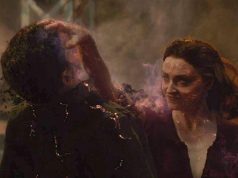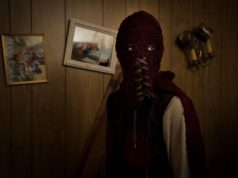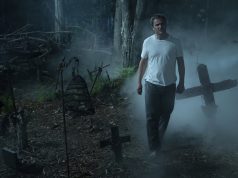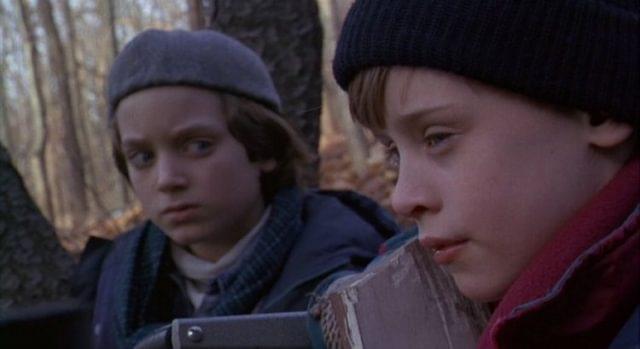
Friday night, Craig, Gina, Jess, Stacy, Joe, Mari, and I went to see “The Good Son.” It was amusing in its badness, and then we went to Denny’s.
— Actual entry in my diary, Sept. 26, 1993.
Movies about evil children have been popular in Hollywood ever since Dorothy invaded Oz, unseated the country’s system of government, and waged a campaign of ethnic cleansing against green-skinned women. Yet despite the genre’s prevalence, Evil Kid movies are seldom very good, and almost never as scary as they’re supposed to be. Sometimes the li’l tykes are too adorable to be taken seriously as agents of mayhem. Everyone knows that’s how Kim Jong Il got as far as he did — he’s just so damn cute!
“The Good Son” dares us not to laugh at it by casting Macaulay Culkin as the junior monster, just months after his success in “Home Alone” and “Home Alone 2: Home Alone Again,” where he was “impish,” perhaps, but not “murderous.” (There is a fine line.) The film also demonstrates the age-old maxim that it’s hard to take a thriller seriously when its credits use the same font as “Bewitched.”
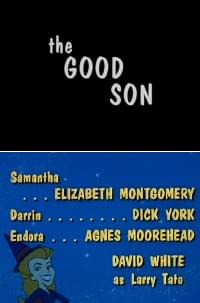
We begin in Arizona, where 10-year-old Mark Evans — played by Elijah Wood, already at his full height (they actually had to make him look taller when he played Frodo) — is grieving his mother’s death from Sad, Unspecified Disease. Sitting at her deathbed, Mark told his mom, “You’re not gonna die. I promise. You’re not gonna die ’cause I won’t let you.” So in addition to being motherless, Mark is also a filthy liar.
Mark’s dad, Jack (David Morse), figures the death of his beloved wife would be the best time to take a two-week business trip, an opinion shared by his brother Wallace (Daniel Hugh Kelly), who offers to let young Mark come stay with his family in Maine. And since Jack only has two weeks in which to “close this deal” (whatever it is), he figures the best use of his time is to drive the 2,800 miles from Arizona to Maine to drop Mark off in person.
Despite the film’s flawless logic so far, things begin to unravel in Maine. Mark has two cousins — Henry, his same age, played by Macaulay Culkin, and little Connie, played by lost Culkin sibling Quinn Culkin. (This is the only movie she ever appeared in. She’s now 25 years old, and wherever she is, I assume she spends her days engaged in the family business of suing her parents.) Mark also has an aunt, Susan (Wendy Crewson), who he decides must be the reincarnation of his mother. This suggests that Mark has only a rudimentary grasp of the tenets of Hinduism and should not be permitted to practice as a yogi.
What follows is a series of scenes designed to show that Henry is evil. He almost drops Mark out of his treehouse. He uses a contraption, which he seems to have built himself, to shoot a bolt at a cat. (He misses; it might have been OK anyway because the cat looks like Hitler.) He uses the same weapon to shoot a dog. He uses a lifelike dummy to cause a 10-car pileup. He accepts billions of dollars in bailout money, then immediately takes a week-long executive retreat to the Caribbean. The list goes on and on.
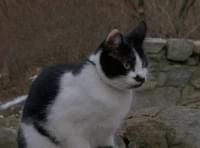
All of this is amusing enough insofar as you enjoy seeing the kid from “Home Alone” commit felonies, which it is safe to say we all enjoy a great deal. However, it is not scary or tense or thrilling, like it’s supposed to be — but don’t mention that to the man who composed the musical score, the legendary Elmer Bernstein! When he wrote the music, he was apparently watching some other movie, something full of drama and suspense. And good for him. If he’d written a score appropriate for “The Good Son,” it would have involved a lot of sad trombones and circus calliopes.
Henry steps up his game by going after his sister, poor little Connie, the remainder Culkin. While skating on a frozen pond, he “accidentally” pushes her into the cordoned-off thin-ice area, whereupon she breaks through into the water. All the adults on the pond watch from a respectful distance, doing nothing, while Henry pretends to try to get her out. At last someone arrives with an ax, which is needed to make a new hole in the ice because, I don’t know, they didn’t like the hole Connie made when she fell through. (I don’t have any experience with this sort of thing. Can you not pull something out of the same ice hole it went into? Are ice holes one-way only?)
Mark is horrified by Henry’s behavior and tells his Aunt Susan about it, though she is understandably reluctant to accept that her son is a psychopath. The mothers of Jeffrey Dahmer, Ted Bundy, and Donald Trump all had a hard time with it, too. The centerpiece of Mark’s case is the ice-skating incident, but he was the only witness to Henry’s involvement in it. The things he has tangible evidence of — the dead dog, the bolt gun, etc. — he neglects to mention. So add “lawyer” to the list of things Mark won’t be good at, after “yogi” and “promise-keeper.”
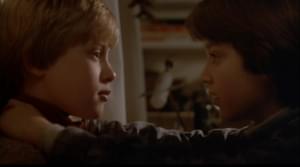
Everything comes to a head in a silly climax, which is probably the only kind of climax that a flailing, bug-eyed thriller like this could have had. I’m going to spoil it for you, so put on your spoilpants. See, Aunt Susan finds out that her baby son who drowned in the bathtub a few years ago didn’t die accidentally — Henry drowned him. (You realized this the moment it was mentioned that Susan’s other son had drowned, but Susan is slower than you.) She now starts to understand that Henry is a psycho after all, in part because in addition to revealing the truth about the drowned baby, he also pushes her off a cliff. I would remind kids that while this is a good method of getting your mother’s attention, you can really only use it once.
Susan hangs on as Mark comes running up to grapple with Henry, whereupon somehow Susan gets back up onto the ledge and both of the boys go over, each clinging to one of Susan’s hands. She can’t pull them both to safety, so she has to choose between her loving nephew and her insane, murderous son. But when Mark ran out to the cliff, he was being closely pursued by Uncle Wallace, so if Susan can just hang on a few seconds longer, her husband will be along to help. Except Wallace never shows up. The movie seems to have forgotten all about him. My theory is that the actor had some sick time saved up that he had to use before the end of the shoot and they sent him home early. Whatever the case, Susan has to choose, and she opts to let go of crazy Henry and let him plunge to his death in the rocky sea below. Audiences who had seen Macaulay Culkin stung to death by bees just two years earlier in “My Girl” now got to see him dropped from a cliff by his mother in “The Good Son.” The burglars from “Home Alone” called it “the feel-good movie of the year!”
Note: If you examine the diary entry at the beginning of this column carefully, you will see that I attended “The Good Son” as a seventh wheel.
— Film.com


